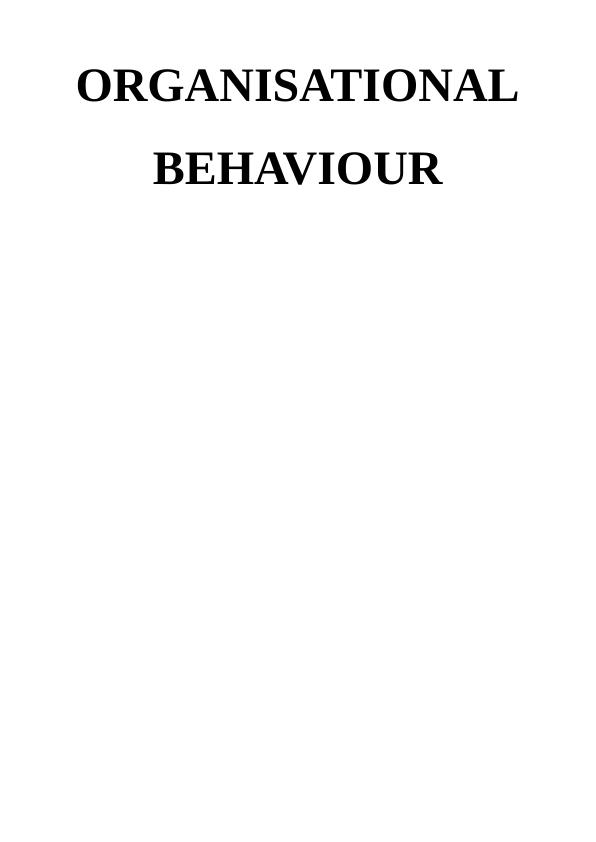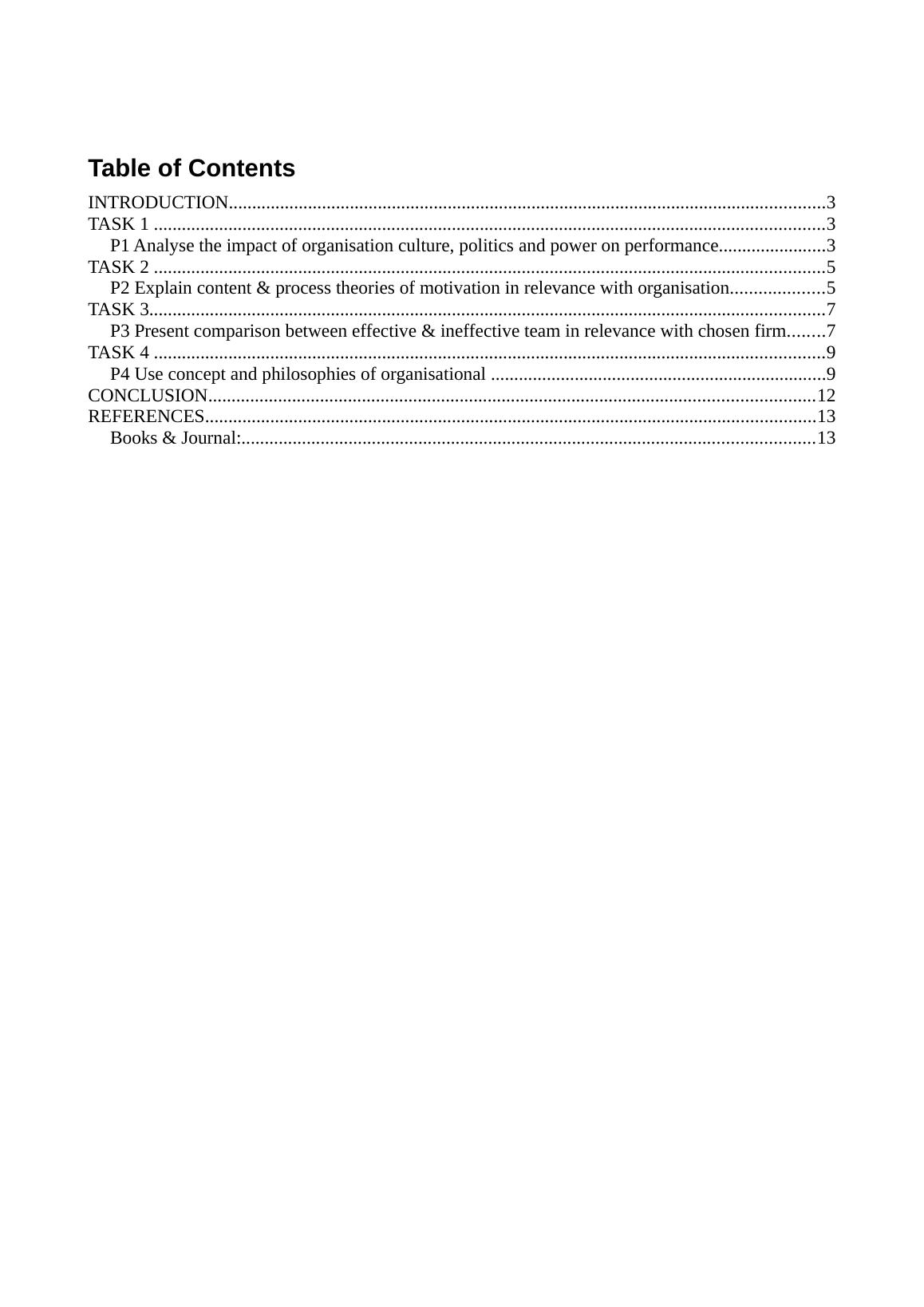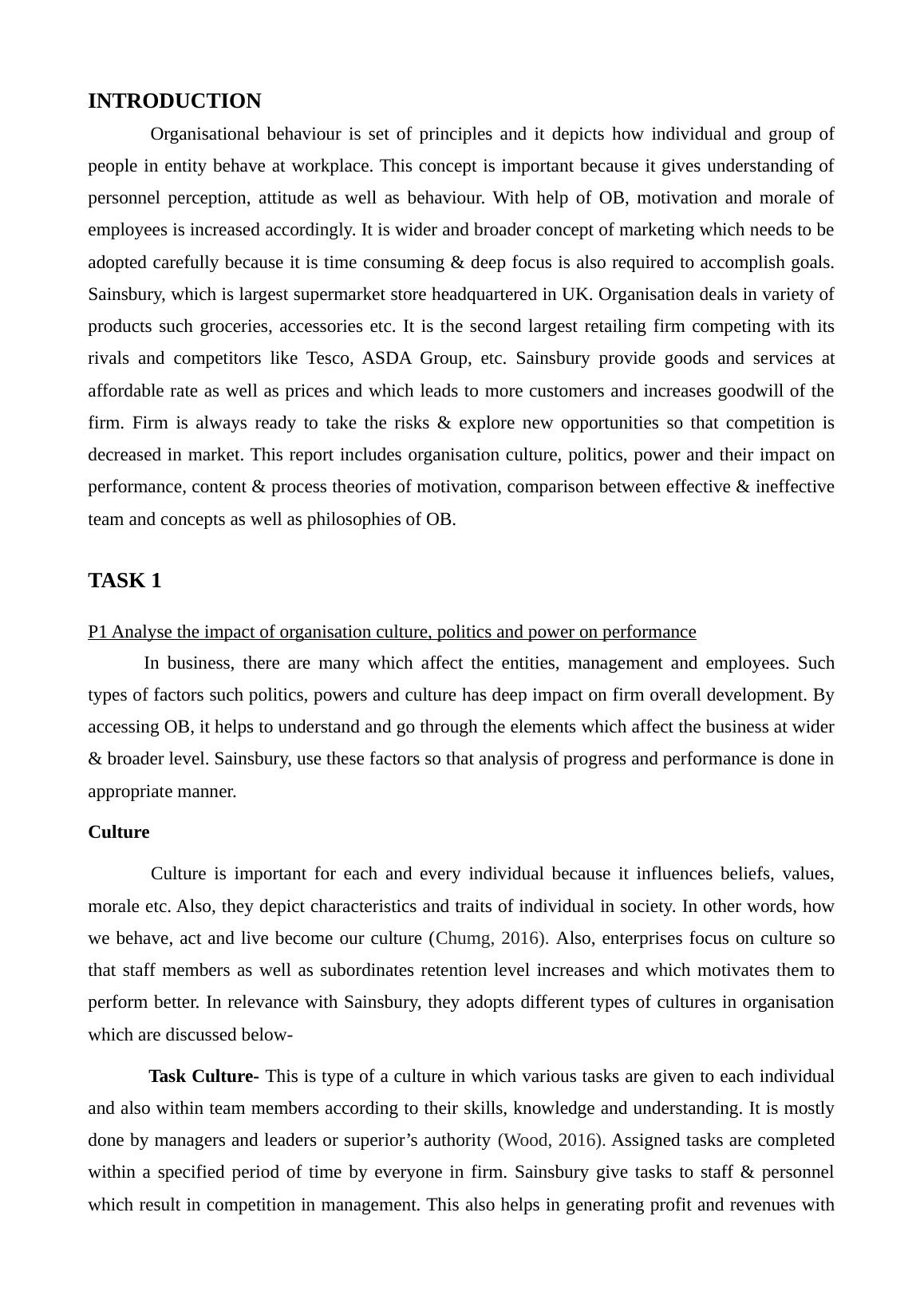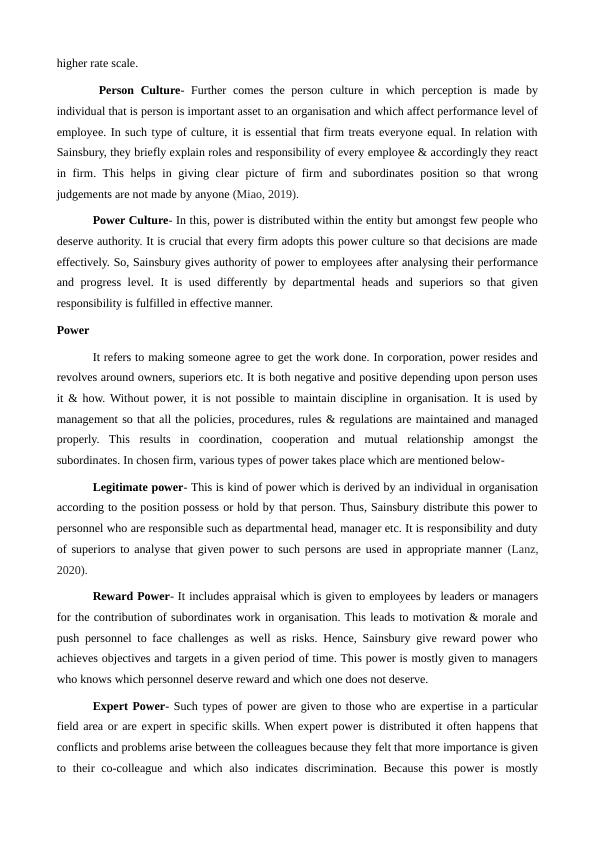Impact of Organizational Culture, Politics, and Power on Performance
Added on 2023-01-12
14 Pages4782 Words23 Views
ORGANISATIONAL
BEHAVIOUR
BEHAVIOUR

Table of Contents
INTRODUCTION................................................................................................................................3
TASK 1 ................................................................................................................................................3
P1 Analyse the impact of organisation culture, politics and power on performance.......................3
TASK 2 ................................................................................................................................................5
P2 Explain content & process theories of motivation in relevance with organisation....................5
TASK 3.................................................................................................................................................7
P3 Present comparison between effective & ineffective team in relevance with chosen firm........7
TASK 4 ................................................................................................................................................9
P4 Use concept and philosophies of organisational ........................................................................9
CONCLUSION..................................................................................................................................12
REFERENCES...................................................................................................................................13
Books & Journal:...........................................................................................................................13
INTRODUCTION................................................................................................................................3
TASK 1 ................................................................................................................................................3
P1 Analyse the impact of organisation culture, politics and power on performance.......................3
TASK 2 ................................................................................................................................................5
P2 Explain content & process theories of motivation in relevance with organisation....................5
TASK 3.................................................................................................................................................7
P3 Present comparison between effective & ineffective team in relevance with chosen firm........7
TASK 4 ................................................................................................................................................9
P4 Use concept and philosophies of organisational ........................................................................9
CONCLUSION..................................................................................................................................12
REFERENCES...................................................................................................................................13
Books & Journal:...........................................................................................................................13

INTRODUCTION
Organisational behaviour is set of principles and it depicts how individual and group of
people in entity behave at workplace. This concept is important because it gives understanding of
personnel perception, attitude as well as behaviour. With help of OB, motivation and morale of
employees is increased accordingly. It is wider and broader concept of marketing which needs to be
adopted carefully because it is time consuming & deep focus is also required to accomplish goals.
Sainsbury, which is largest supermarket store headquartered in UK. Organisation deals in variety of
products such groceries, accessories etc. It is the second largest retailing firm competing with its
rivals and competitors like Tesco, ASDA Group, etc. Sainsbury provide goods and services at
affordable rate as well as prices and which leads to more customers and increases goodwill of the
firm. Firm is always ready to take the risks & explore new opportunities so that competition is
decreased in market. This report includes organisation culture, politics, power and their impact on
performance, content & process theories of motivation, comparison between effective & ineffective
team and concepts as well as philosophies of OB.
TASK 1
P1 Analyse the impact of organisation culture, politics and power on performance
In business, there are many which affect the entities, management and employees. Such
types of factors such politics, powers and culture has deep impact on firm overall development. By
accessing OB, it helps to understand and go through the elements which affect the business at wider
& broader level. Sainsbury, use these factors so that analysis of progress and performance is done in
appropriate manner.
Culture
Culture is important for each and every individual because it influences beliefs, values,
morale etc. Also, they depict characteristics and traits of individual in society. In other words, how
we behave, act and live become our culture (Chumg, 2016). Also, enterprises focus on culture so
that staff members as well as subordinates retention level increases and which motivates them to
perform better. In relevance with Sainsbury, they adopts different types of cultures in organisation
which are discussed below-
Task Culture- This is type of a culture in which various tasks are given to each individual
and also within team members according to their skills, knowledge and understanding. It is mostly
done by managers and leaders or superior’s authority (Wood, 2016). Assigned tasks are completed
within a specified period of time by everyone in firm. Sainsbury give tasks to staff & personnel
which result in competition in management. This also helps in generating profit and revenues with
Organisational behaviour is set of principles and it depicts how individual and group of
people in entity behave at workplace. This concept is important because it gives understanding of
personnel perception, attitude as well as behaviour. With help of OB, motivation and morale of
employees is increased accordingly. It is wider and broader concept of marketing which needs to be
adopted carefully because it is time consuming & deep focus is also required to accomplish goals.
Sainsbury, which is largest supermarket store headquartered in UK. Organisation deals in variety of
products such groceries, accessories etc. It is the second largest retailing firm competing with its
rivals and competitors like Tesco, ASDA Group, etc. Sainsbury provide goods and services at
affordable rate as well as prices and which leads to more customers and increases goodwill of the
firm. Firm is always ready to take the risks & explore new opportunities so that competition is
decreased in market. This report includes organisation culture, politics, power and their impact on
performance, content & process theories of motivation, comparison between effective & ineffective
team and concepts as well as philosophies of OB.
TASK 1
P1 Analyse the impact of organisation culture, politics and power on performance
In business, there are many which affect the entities, management and employees. Such
types of factors such politics, powers and culture has deep impact on firm overall development. By
accessing OB, it helps to understand and go through the elements which affect the business at wider
& broader level. Sainsbury, use these factors so that analysis of progress and performance is done in
appropriate manner.
Culture
Culture is important for each and every individual because it influences beliefs, values,
morale etc. Also, they depict characteristics and traits of individual in society. In other words, how
we behave, act and live become our culture (Chumg, 2016). Also, enterprises focus on culture so
that staff members as well as subordinates retention level increases and which motivates them to
perform better. In relevance with Sainsbury, they adopts different types of cultures in organisation
which are discussed below-
Task Culture- This is type of a culture in which various tasks are given to each individual
and also within team members according to their skills, knowledge and understanding. It is mostly
done by managers and leaders or superior’s authority (Wood, 2016). Assigned tasks are completed
within a specified period of time by everyone in firm. Sainsbury give tasks to staff & personnel
which result in competition in management. This also helps in generating profit and revenues with

higher rate scale.
Person Culture- Further comes the person culture in which perception is made by
individual that is person is important asset to an organisation and which affect performance level of
employee. In such type of culture, it is essential that firm treats everyone equal. In relation with
Sainsbury, they briefly explain roles and responsibility of every employee & accordingly they react
in firm. This helps in giving clear picture of firm and subordinates position so that wrong
judgements are not made by anyone (Miao, 2019).
Power Culture- In this, power is distributed within the entity but amongst few people who
deserve authority. It is crucial that every firm adopts this power culture so that decisions are made
effectively. So, Sainsbury gives authority of power to employees after analysing their performance
and progress level. It is used differently by departmental heads and superiors so that given
responsibility is fulfilled in effective manner.
Power
It refers to making someone agree to get the work done. In corporation, power resides and
revolves around owners, superiors etc. It is both negative and positive depending upon person uses
it & how. Without power, it is not possible to maintain discipline in organisation. It is used by
management so that all the policies, procedures, rules & regulations are maintained and managed
properly. This results in coordination, cooperation and mutual relationship amongst the
subordinates. In chosen firm, various types of power takes place which are mentioned below-
Legitimate power- This is kind of power which is derived by an individual in organisation
according to the position possess or hold by that person. Thus, Sainsbury distribute this power to
personnel who are responsible such as departmental head, manager etc. It is responsibility and duty
of superiors to analyse that given power to such persons are used in appropriate manner (Lanz,
2020).
Reward Power- It includes appraisal which is given to employees by leaders or managers
for the contribution of subordinates work in organisation. This leads to motivation & morale and
push personnel to face challenges as well as risks. Hence, Sainsbury give reward power who
achieves objectives and targets in a given period of time. This power is mostly given to managers
who knows which personnel deserve reward and which one does not deserve.
Expert Power- Such types of power are given to those who are expertise in a particular
field area or are expert in specific skills. When expert power is distributed it often happens that
conflicts and problems arise between the colleagues because they felt that more importance is given
to their co-colleague and which also indicates discrimination. Because this power is mostly
Person Culture- Further comes the person culture in which perception is made by
individual that is person is important asset to an organisation and which affect performance level of
employee. In such type of culture, it is essential that firm treats everyone equal. In relation with
Sainsbury, they briefly explain roles and responsibility of every employee & accordingly they react
in firm. This helps in giving clear picture of firm and subordinates position so that wrong
judgements are not made by anyone (Miao, 2019).
Power Culture- In this, power is distributed within the entity but amongst few people who
deserve authority. It is crucial that every firm adopts this power culture so that decisions are made
effectively. So, Sainsbury gives authority of power to employees after analysing their performance
and progress level. It is used differently by departmental heads and superiors so that given
responsibility is fulfilled in effective manner.
Power
It refers to making someone agree to get the work done. In corporation, power resides and
revolves around owners, superiors etc. It is both negative and positive depending upon person uses
it & how. Without power, it is not possible to maintain discipline in organisation. It is used by
management so that all the policies, procedures, rules & regulations are maintained and managed
properly. This results in coordination, cooperation and mutual relationship amongst the
subordinates. In chosen firm, various types of power takes place which are mentioned below-
Legitimate power- This is kind of power which is derived by an individual in organisation
according to the position possess or hold by that person. Thus, Sainsbury distribute this power to
personnel who are responsible such as departmental head, manager etc. It is responsibility and duty
of superiors to analyse that given power to such persons are used in appropriate manner (Lanz,
2020).
Reward Power- It includes appraisal which is given to employees by leaders or managers
for the contribution of subordinates work in organisation. This leads to motivation & morale and
push personnel to face challenges as well as risks. Hence, Sainsbury give reward power who
achieves objectives and targets in a given period of time. This power is mostly given to managers
who knows which personnel deserve reward and which one does not deserve.
Expert Power- Such types of power are given to those who are expertise in a particular
field area or are expert in specific skills. When expert power is distributed it often happens that
conflicts and problems arise between the colleagues because they felt that more importance is given
to their co-colleague and which also indicates discrimination. Because this power is mostly

End of preview
Want to access all the pages? Upload your documents or become a member.
Related Documents
Impact of Organizational Politics, Culture, and Power on Individual and Team Behaviorlg...
|12
|3647
|89
Influence of Organizational Culture, Politics, and Power on Individual and Team Behavior and Performancelg...
|19
|5495
|75
Impact of Organisational Culture, Politics, and Power on Individual and Team Behaviorlg...
|21
|5215
|29
Unit 12 –Organisational Behaviourlg...
|15
|4915
|43
Organisational Behaviour: Influence of Culture, Power, Politics, Motivation, and Team Development on Performancelg...
|19
|5672
|402
Organisational Behaviour: Influence of Culture, Power, Politics and Motivation on Individual Performancelg...
|14
|4640
|252
